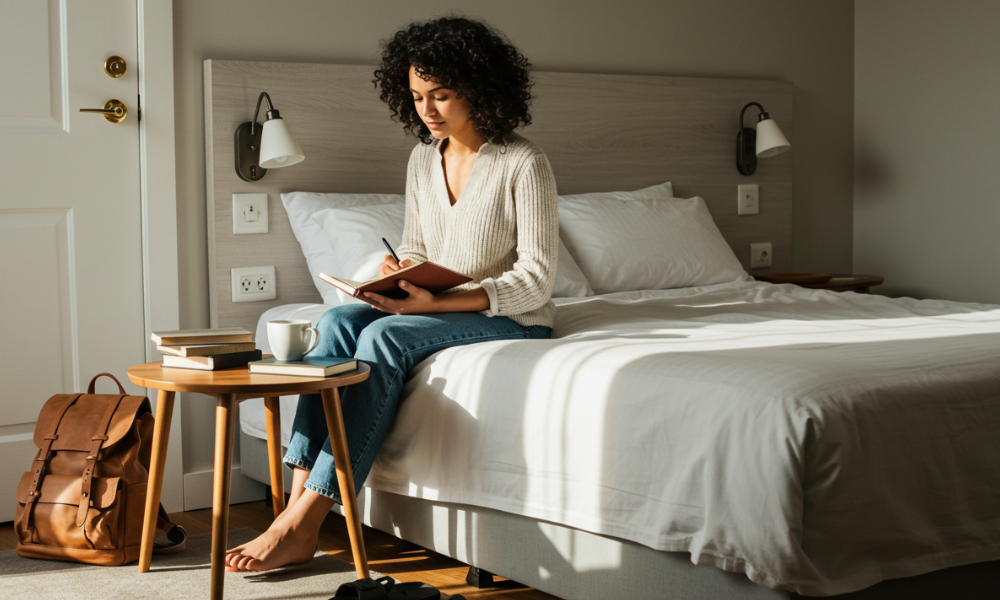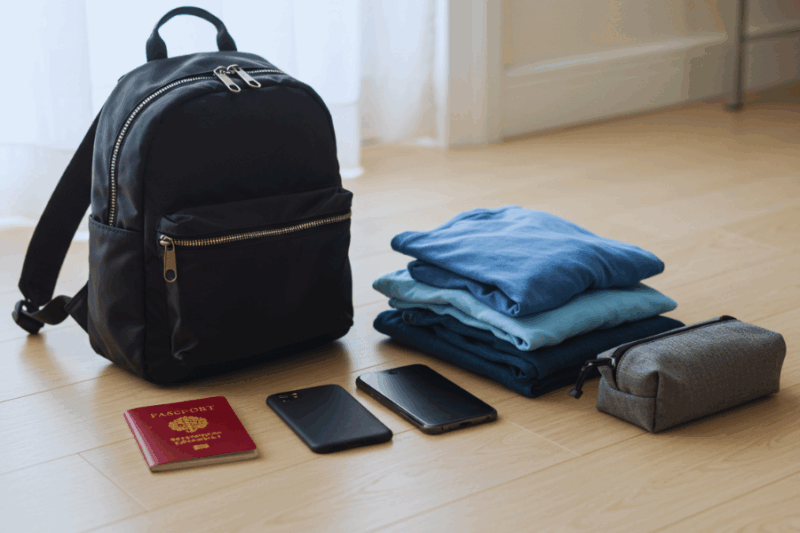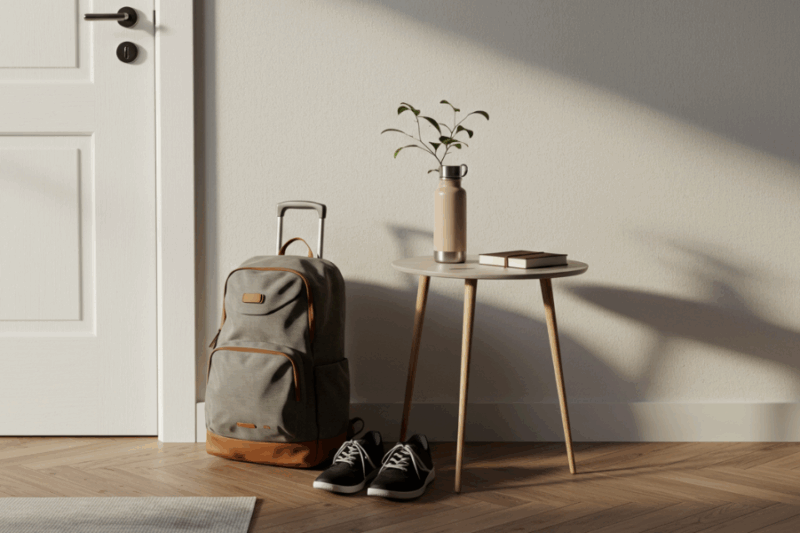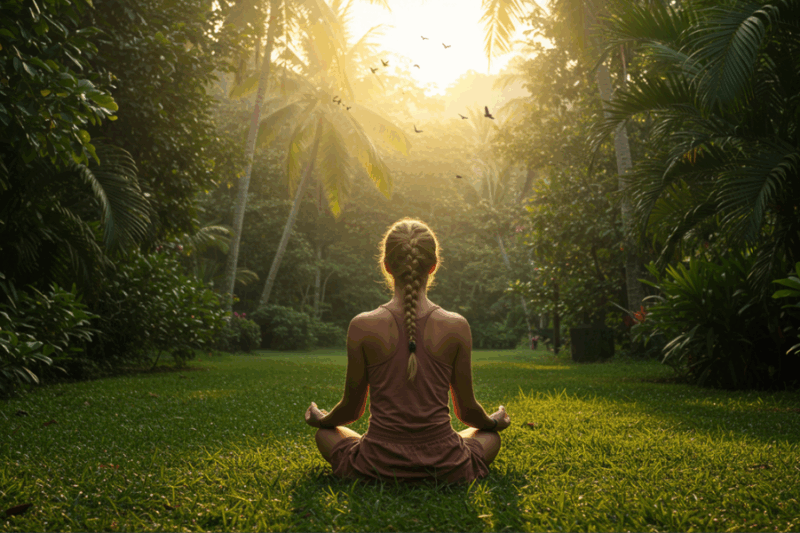Traveling opens up a world of new experiences, but the constant change of environments, time zones, and schedules can throw off your rhythm. For minimalist travelers, a simple morning routine is a powerful way to ground yourself, boost energy, and set a positive tone for the day—all while keeping your packing light and your mindset uncluttered. These routines are designed to be flexible, requiring minimal gear and time, so you can adapt them whether you’re in a Bangkok hostel or a Bali homestay. Here’s a guide to easy morning rituals to start your travel days right, with tips to keep them practical and effective.

Why Morning Routines Matter for Travelers
A consistent morning routine combats travel fatigue, jet lag, and culture shock by providing stability. For minimalist travelers, these rituals align with the ethos of simplicity—needing little space, equipment, or expense—while maximizing mental clarity and physical readiness. On my last trip to Hanoi, a 10-minute routine of stretching and coffee helped me tackle bustling markets with focus. These practices, taking 5–20 minutes, ensure you’re energized for adventures without weighing down your carry-on.
1. Hydrate First Thing
After a night’s sleep (or a long flight), dehydration is common, especially in tropical climates like Thailand or Vietnam. Start your day by drinking 16–20 oz of water to rehydrate and boost alertness. In Siem Reap, I carried a reusable water bottle (Hydro Flask, $15) and filled it with boiled or bottled water from my hostel. If safe, add a slice of local fruit like lime for flavor. This ritual requires no extra gear beyond a bottle you already pack and sets a healthy tone for the day. How to Do It: Keep your water bottle by your bed or hostel bunk. Drink slowly upon waking, before coffee or breakfast. Why It Works: Hydration improves energy and digestion, countering travel’s toll (e.g., dry plane air).
Time: 2 minutes.
2. Light Stretching or Yoga
A 5-minute stretch session wakes up your body, especially after cramped bus rides or hostel bunks. In Chiang Mai, I did simple stretches (neck rolls, forward folds, cat-cow) on my guesthouse balcony, easing stiffness from overnight trains. No mat needed—use a towel or scarf from your capsule wardrobe. Focus on hips, shoulders, and back to release tension. If you prefer yoga, try sun salutations for a quick flow. Apps like Down Dog (free basic version) offer guided sessions offline. How to Do It: Find a quiet corner (room, park, beach). Follow a memorized sequence or app. Wear comfy clothes from your travel kit (e.g., quick-dry shorts). Why It Works: Boosts circulation and flexibility, countering travel’s physical strain.
Time: 5–7 minutes.
3. Mindful Breathing or Meditation
A brief mindfulness practice calms travel-related stress, like navigating crowded Delhi markets or missing a bus in Kuala Lumpur. Spend 3–5 minutes on deep breathing (inhale 4 seconds, hold 4, exhale 4) or a guided meditation. In Ubud, I sat by a rice field, using the free Insight Timer app for a 5-minute session, which sharpened my focus for temple visits. No gear needed—just your phone or a quiet moment. Journaling one sentence about your day’s intention (e.g., “Stay open to new experiences”) in a small notebook ($3) adds clarity. How to Do It: Sit comfortably (bed, chair, ground). Close eyes, focus on breath, or use an app. Jot down a quick intention. Why It Works: Reduces anxiety and enhances presence, key for cultural immersion.
Time: 3–5 minutes.
4. Quick Breakfast or Coffee Ritual
A simple breakfast fuels your morning without slowing you down. In Da Nang, I grabbed a banh mi ($1) from a street stall or ate a banana ($0.50) from my daypack, paired with local coffee (ca phe sua da, $1). If your accommodation has a kitchen, make oatmeal with nuts from your stash ($0.50/serving). Carry a reusable container (Stasher, $10) for portable snacks. Savoring a coffee or tea while people-watching grounds you in the local vibe, like at a Hanoi cafe. How to Do It: Buy local street food or pack easy snacks (nuts, dried fruit). Find a cafe or market stall. Eat mindfully, noting flavors or surroundings. Why It Works: Provides energy and a cultural touchpoint without complex planning.
Time: 5–10 minutes.
5. Plan Your Day Briefly
Spend 2–3 minutes reviewing your day’s priorities to stay focused and avoid travel overwhelm. In Kyoto, I used a small notebook to list two must-see spots (e.g., Fushimi Inari, Arashiyama) and checked offline Maps.me for routes. Note transport options (e.g., Bangkok BTS, $1/ride) or free activities (parks, markets). For minimalist travelers, this keeps your itinerary light—focus on 1–2 highlights, leaving room for spontaneity. How to Do It: Jot down 1–2 key activities, transport, and a budget ($20–30/day). Use offline apps or a pocket guidebook.
Why It Works: Clarifies your day, reducing decision fatigue in new environments.
Time: 2–3 minutes.
Minimalist Travel Tips
- Pack Light: Carry only essentials for your routine—water bottle ($15), notebook ($3), reusable container ($10), and phone with offline apps (free). Fits in a 20L backpack.
- Budget Wisely: Breakfast and coffee cost $1–3/day, keeping daily expenses low ($15–25 total). Buy snacks in bulk (nuts, $1/serving) to save.
- Adapt to Space: Use hostel rooms, cafe corners, or public parks for routines. No extra gear needed beyond your capsule wardrobe (3 tops, 2 bottoms).
- Stay Flexible: Adjust for time zones or early tours (e.g., Angkor Wat sunrise). Skip meditation if rushed but keep hydration and planning.
- Cultural Respect: Dress modestly for morning market visits (scarf, $5) and learn greetings (e.g., “sabaidee” in Laos) to connect with vendors.
- Combat Jet Lag: Hydrate and stretch to reset your body clock, especially after long flights (e.g., 12-hour US–Asia routes).
Why These Routines Work
These morning routines are tailored for minimalist travel, requiring minimal time (10–20 minutes) and gear while delivering maximum impact. They combat travel’s challenges—jet lag, stress, disorientation—by fostering physical and mental resilience. On my Vietnam trip, this routine saved me $5–10/day by avoiding overpriced hotel breakfasts and kept me energized for 12-hour exploration days. The simplicity ensures you can maintain them anywhere, from a Phnom Penh guesthouse to a Tokyo capsule hotel.



